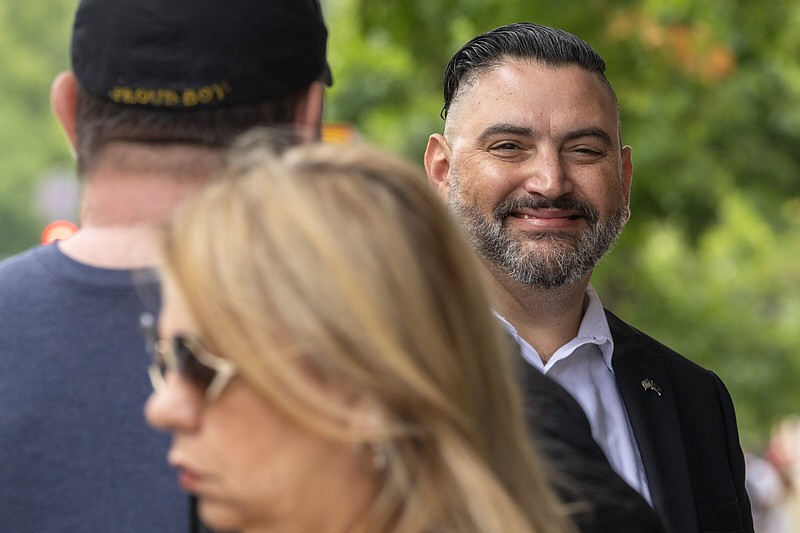WASHINGTON -- The sentencing for former Proud Boys national leader Enrique Tarrio, who was convicted of orchestrating the far-right extremist group's part in the riot at the U.S. Capitol after Donald Trump lost the 2020 election, has been delayed until next week because the judge hearing the case became sick.
Prosecutors are seeking 33 years behind bars for Tarrio, who had been scheduled for sentencing on Wednesday. That would be the longest sentence so far among hundreds of Capitol riot cases.
U.S. District Judge Timothy Kelly, who postponed the sentencing shortly before it was to take place, isn't bound by prosecutors' recommendation when he sentences Tarrio in Washington's federal courthouse, which sits within view of the Capitol. The sentencing for former Proud Boys chapter leader Ethan Nordean was also delayed Wednesday; it will now be Friday.
Kelly this week also was scheduled to sentence three other Proud Boys members who were convicted by a jury in May after a trial alongside Tarrio and Nordean. It's unclear whether their hearings will be postponed, too.
Tarrio had already been arrested and ordered to leave Washington, D.C., by the time Proud Boys members joined thousands of Trump supporters in storming the Capitol on Jan. 6, 2021, as lawmakers met to certify Joe Biden's election victory. But prosecutors say Tarrio organized and led the group's assault from afar, inspiring followers with his charisma and penchant for propaganda.
Tarrio was a top target in one of the most important Capitol riot cases prosecuted by the Justice Department. He and three lieutenants were convicted in May of charges including seditious conspiracy -- a rarely brought Civil War-era offense that the Justice Department levied against members of far-right groups who played a key role in the Jan. 6 violence. His sentencing, now set for Tuesday, caps one of the most significant prosecutions in the U.S. Capitol riot.
"Using his powerful platform, Tarrio has repeatedly and publicly indicated that he has no regrets about what he helped make happen on January 6," prosecutors wrote in a court filing.
Tarrio, Nordean and fellow Proud Boys Joseph Biggs and Zachary Rehl were convicted of seditious conspiracy. A fifth Proud Boys member, Dominic Pezzola, was acquitted of seditious conspiracy but convicted of other serious charges.
Prosecutors also recommended prison sentences of 33 years for Biggs, 30 years for Rehl, 27 years for Nordean and 20 years for Pezzola. Nordean, of Auburn, Wash., and Rehl, of Philadelphia, led local Proud Boys chapters. Biggs, of Ormond Beach, Fla., was a self-described Proud Boys organizer. Pezzola was a group member from Rochester, N.Y.
Tarrio's lawyers denied the Proud Boys had any plan to riot at the Capitol. They argued that prosecutors used Tarrio as a scapegoat for Trump, who spoke at the "Stop the Steal" rally near the White House on Jan. 6 and urged his supporters to "fight like hell."
In urging the judge for a lenient sentence, Tarrio's lawyers noted in court papers that he has a history of cooperating with law enforcement. Court records uncovered in 2021 showed that Tarrio previously worked undercover and cooperated with investigators after he was accused of fraud in 2012.
Tarrio's lawyers urged the judge "to see another side of him -- one that is benevolent, cooperative with law enforcement, useful in the community, hardworking and with a tight-knit family unit and community support."
Information for this article was contributed by Eric Tucker of The Associated Press.
